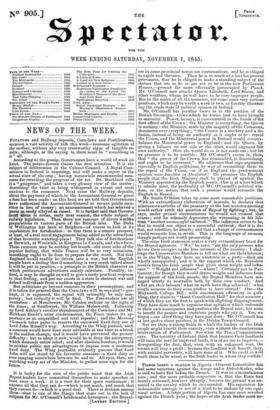It is lucky for the ease of the public mind
that the Irish Repeal leaders have committed themselves to make speeches at least once a week : it is a vent for their spare restlessness; it exposes all that they can do—which is not much, and much that they cannot do—which is a good deal. There is division among them—that is one of the things that come out in the laek of subjects for Mr. O'Connell's hebdomadal harangues: the Repeal-
era in some provincial towns are contumacious, and he is obliged to cajole and threaten. Then he is so much at a loss for present grievances, that he is obliged to make a standing subject of the statues that are to be or are not to be in the new Parliament Houses,—ground far more effectually preoccupied by Punch. Mr. O'Connell now attacks Queen Elizabeth, Lord Bacon, and other worthies, whom he will have to be very improper people. But in the midst of all the nonsense out come some very curious positions, which may be worth a word or two, as forcibly illustrat:. ing the crude state of political opinion in Ireland. Mr. O'Connell has peculiar views as to the position of the British Sovereign—views which he seems just to have brought to maturity. Power, he says, is concentrated in the hands of the first officer of the Crown ; the Minister is everything, the Queen is nothing: the Minister, made by the majority of the Commons, domineers over everything; "the Crown is a mockery and a de- lusion, instead of being an authority as it ought to be : repeal the Union, and the Ministerial power in Ireland would counter- balance the Ministerial power in England ; and the Queen, by giving a balance on one side or the other, would augment her own authority." How she would do so is not made out; but let us presume it to be possible : Mr. O'Connell's axiom is, then, that " the power of the Crown has diminished, is diminishing, and ought to be increased." Ile addresses that sage argument especially to English politicians, by way of reconciling tfleiT to the repeal of the Union,—as if in England the predominant opinion were Jacobite or Absolutist! He promises the English people that the Irish Ministry shall be played off against the Ministry appointed by the English people. One is at a loss which to admire most, the profundity of Mr. O'Connell's political wis- dom, or the notion that such a promise would reconcile the English to Repeal.
Mr. Smith O'Brien takes up some more remarkable positions. With an extraordinary elaboration of inuendo, he declares that nineteen-twentieths of the peasantry at the last monster-meeting
would rather settle the question of by fighting; but, he says, under present circumstances he would not counsel that course ; and he solemnly deprecates the witnessing in his life- time "another unsuccessful outbreak." The inference ieema to be, that he would not object to a successful outbreak; that it is de- feat, not rebellion, he dreads; and that a change of circumstances would reconcile him to revolt. This is the language of treason, though perhaps not worth prosecuting. The same Irish statesman makes a very extraordinary boast for the Repeal agitators. "We," he says, "are the only persons who devote their energies to the true interests of the country : I chal- lenge the Conservative Members to tell me what are their labours; as to the Whigs, they have no existence as a party—they are wholly unsupported ; and it is the support which the Repealers receive from the Irish people that gives them weight and influ- ence." "Weight and influence"—where ? Certainly not in Par- liament; for though they would derive weight and influence from the support of the Irish people, the Repeal Members have Ma- naged utterly to neutralize both by their own conduct. And what are their labours? what on earth have they achieved ? what single measure do they even profess to have carried? One—the Maynonth College Bill: with consummate effrontery in quib- bling, , they claim to "thank Conciliation Hall" for that measure; of which they are the first to speak with slighting disparagement. They have done much to organize that agitation which redounds to their own consequence and produces the Repeal rent ; but none to benefit the pauper and credulous people who pay it. Yes we forgot—one other thing they have just done : Mr. O'Connell has
i
at last spoken about potatoes, n the Dublin Town-Council. Nor are there wanting fields in which the leaders of the Irish people might benefit their country, even without the cumbersome intervention of Parliament. See what the Times Commissioner says. The tenantry of Ireland think that because their landlords will raise the rent on improved lands, it is of no use to improve,— disregarding the fact, that, even with an enhanced rent, the tenant will reap a profit : because the landlord will benefit, they, with suicidal perversity, will have none of it. Who could so well teach them to be wiser, as the Irish leader in whom they confide?


























